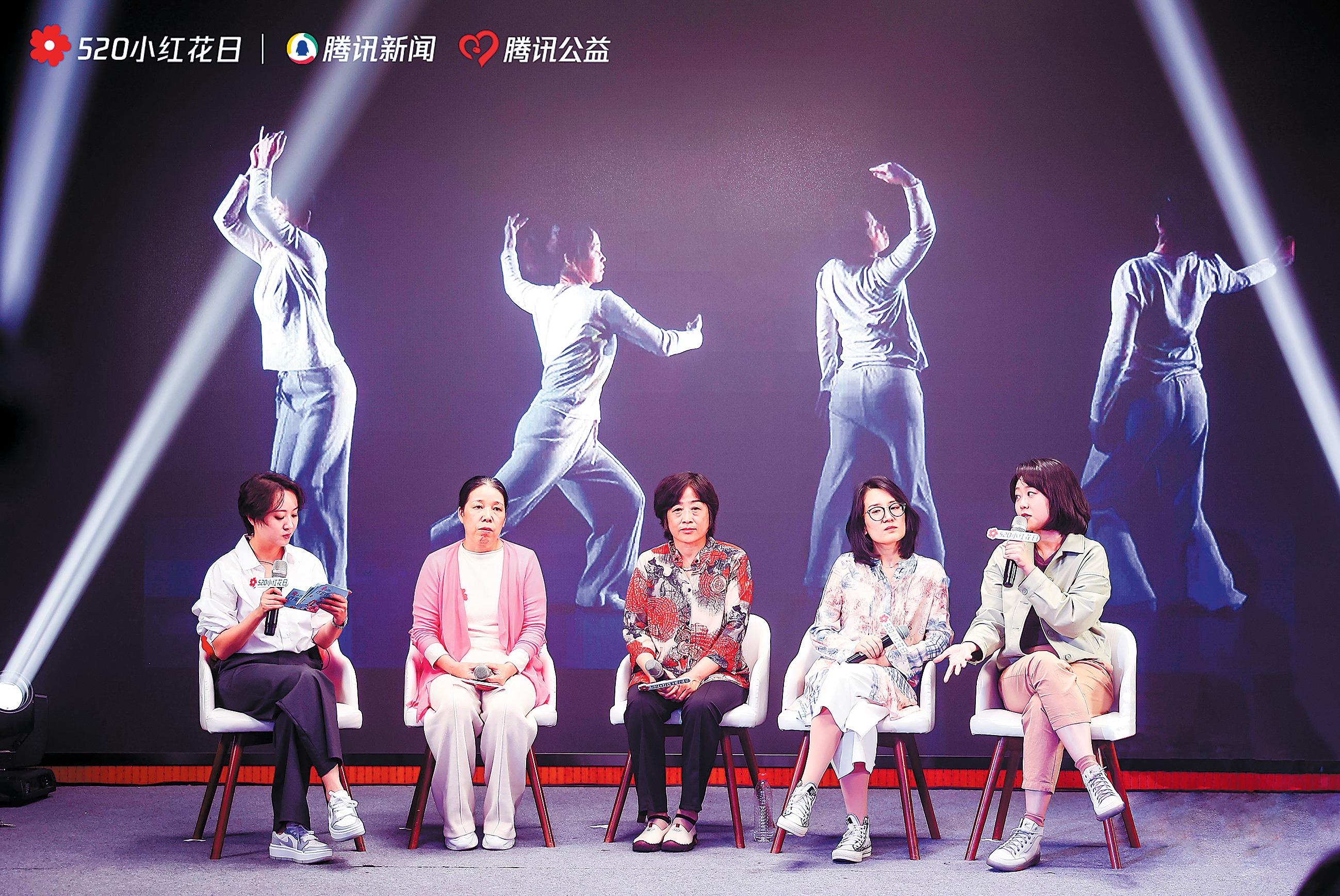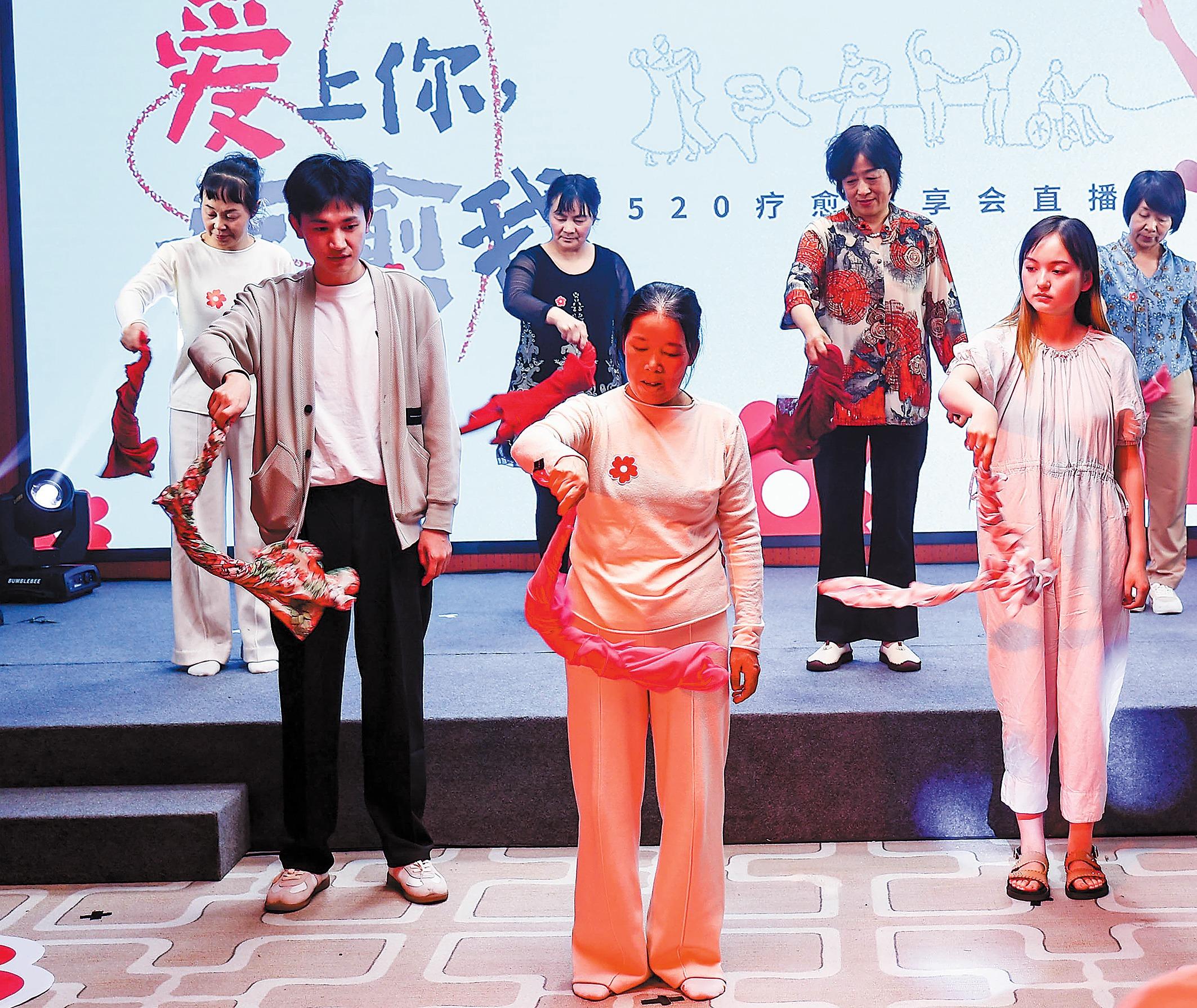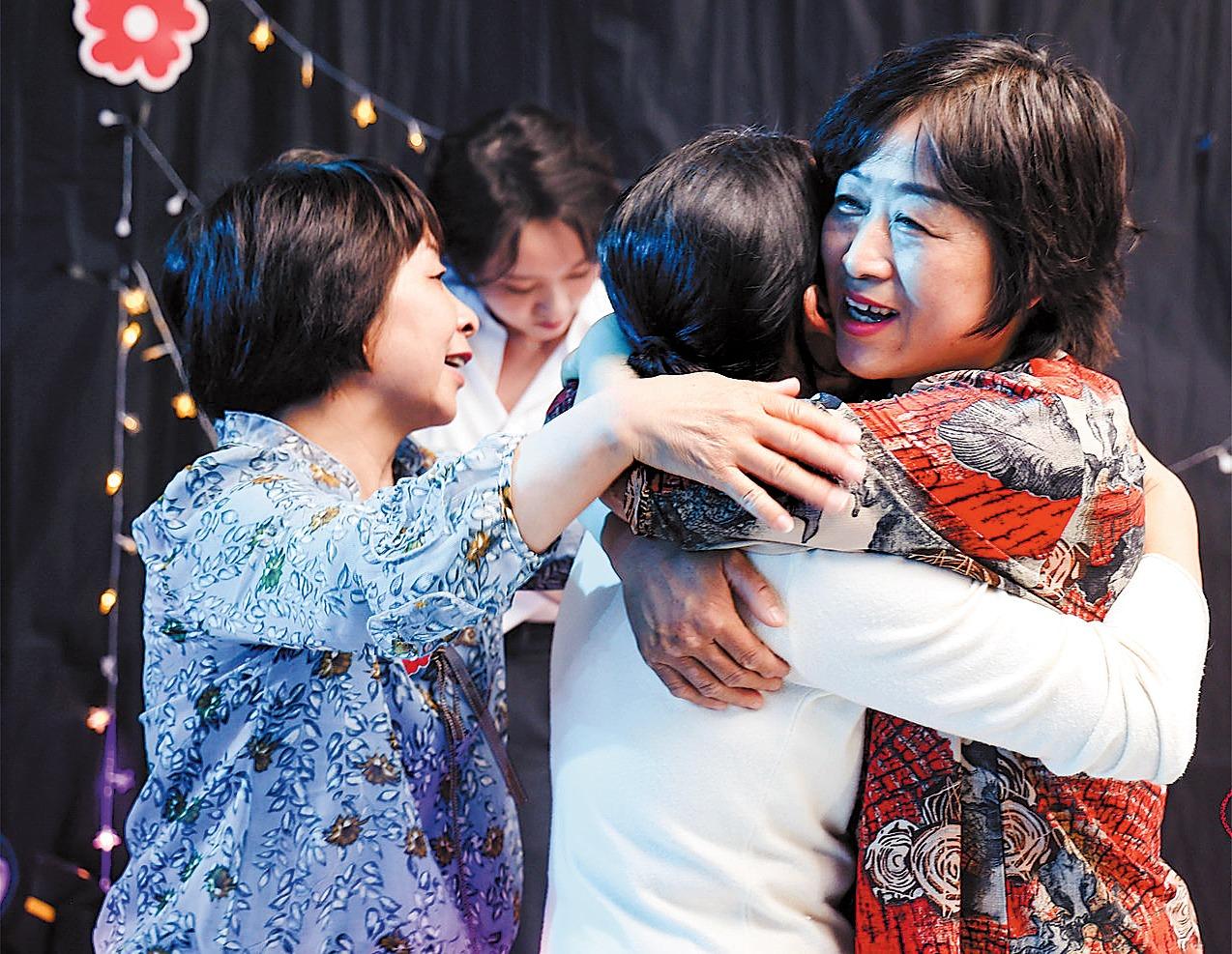Livestream shines spotlight on domestic workers and the organization helping them battle life's emotional burdens through artistic means, Xu Fan reports.
 From left: Shao Wenting, hostess of Tencent News, domestic workers Tan Qirong and Niu Huiling, Yan Weixu, a representative of Beijing Hongyan Social Work Service Center, and director Liao Shuyi, at the event. (PHOTO PROVIDED TO CHINA DAILY)
From left: Shao Wenting, hostess of Tencent News, domestic workers Tan Qirong and Niu Huiling, Yan Weixu, a representative of Beijing Hongyan Social Work Service Center, and director Liao Shuyi, at the event. (PHOTO PROVIDED TO CHINA DAILY)
Bathed in the soft, warm stage lights, two dancers dressed in all-white outfits gaze at each other with deep emotion in their eyes. Slowly, they move toward one another and embrace tightly, as if they were long-lost family members reuniting after many years apart.
The scene is both touching and infectious, but what makes it even more remarkable is that the two performers are not professionals, but rather amateurs who work as domestic workers in Beijing.
At a livestreamed event organized by Tencent News and Tencent Public Welfare on May 20, the two dancers joined a group of guests, mostly ordinary people who use art to find relief from the burdens of life and reignite their sense of hope, sharing how they shake off loneliness and stress in the metropolis while working as nannies.
Other guests included an 82-year-old woman who helps her husband fight the creeping symptoms of Alzheimer's disease with dance, and a young woman with cerebral palsy who launched a nonprofit organization to help other women in her position.
The event attracted thousands of online viewers, with some of them commenting that the most impressive part was the performance by the amateur dancers and their stories.
 Domestic worker Tan Qirong (front), two audience members and four other domestic workers perform the dance Fen Shen during a livestreamed event. (PHOTO PROVIDED TO CHINA DAILY)
Domestic worker Tan Qirong (front), two audience members and four other domestic workers perform the dance Fen Shen during a livestreamed event. (PHOTO PROVIDED TO CHINA DAILY)
The dance, titled Fen Shen (Multiple Roles), has brought together almost 100 female domestic workers from the Beijing Hongyan Social Work Service Center, a public welfare institution that aims to assist domestic workers to enhance their cultural and job-related skills. The participants dedicated their only day off each week, over the course of 36 weeks, to rehearse for the performance.
Niu Huiling, one of the two dancers, is a former rural schoolteacher from Linfen in Central China's Shanxi province. After working in education for 27 years, she had to leave her hometown and seek better-paying work in Beijing due to financial stresses caused by her husband's illness.
"My son had just got married, and we had built a new house in the village. But then my husband fell ill, and we incurred a large amount of debt. My daughter bought me a train ticket to Beijing, so for the first time in my life, I embarked on a new journey alone," she recalls.
It was winter in 2019, about two months before millions of Chinese returned to their hometowns to celebrate Spring Festival, which is the most important family reunion of the year.
However, Niu did not have any excitement for celebrating the upcoming Lunar New Year. Instead, she dragged her tired body from one recruitment agency to another, with the aim of landing a job as a domestic worker as soon as possible, so that she could accumulate the necessary 10,000 yuan ($1,410) within two months.
 Domestic worker Niu Huiling (right) hugs fellow worker Tan. (PHOTO PROVIDED TO CHINA DAILY)
Domestic worker Niu Huiling (right) hugs fellow worker Tan. (PHOTO PROVIDED TO CHINA DAILY)
On the eve of Spring Festival, Niu achieved her goal of earning the targeted income. The success encouraged her to return to Beijing one year later as she still faced financial problems. However, due to the COVID-19 pandemic, there were fewer opportunities for domestic work, so she had to take an unstable job selling food packed in paper boxes to labor workers on a construction site.
"I had been working for three to four months when I received a call from home informing me that my husband's condition had deteriorated. When I returned home, he had already been sent to the intensive care unit. We spent the last 100 days of his life in the hospital," recalls Niu.
Despite enduring immense grief, economic pressure compelled her to return to Beijing for work after the funeral. Over the following months, struggling with a sense of helplessness, she coped by jogging and drinking — until she joined the Hongyan center and found comfort in dancing Fen Shen.
For Tan Qirong, the other dancer and domestic worker joining the Tencent event, the dance also served as a hub to ease her emotional pain. Previously working at a factory in Langfang, Hebei province, Tan, a native from Mianyang in Sichuan province, switched careers from being a delivery person to a domestic worker in the Chinese capital in 2019.
"I was working in Beijing when my father passed away, but my family didn't inform me until six months later. It was a painful experience that I kept buried deep inside. However, during the rehearsal of the dance, I finally felt like I could release my emotions and find peace," says Tan.
According to statistics from the Ministry of Commerce, as of 2021, China had an estimated 37.6 million domestic workers, with most of them being rural females in cities engaged in babysitting or taking care of the elderly, as reported by Southern Weekly, a Guangzhou-based newspaper.
Yan Weixu, the producer of the performance, believes that domestic workers are "invisible residents "of cities, and she hopes that art can help them boost their confidence and enable them to voice their needs and requirements.
Contact the writer at xufan@chinadaily.com.cn


